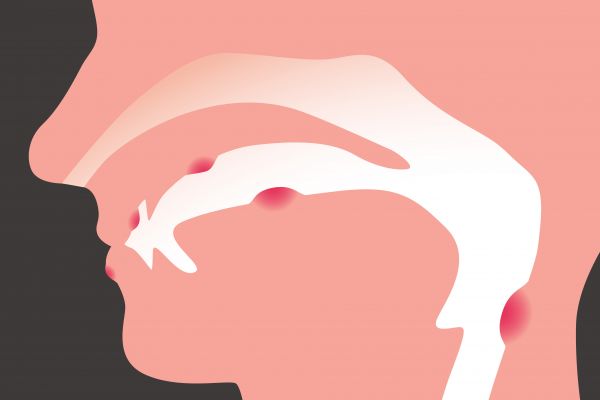What’s your next step if a mouth sore doesn’t go away?
Many of us can relate to the dreaded feeling — your toothbrush slips, you bite down too hard on your tongue or you start to feel a tender spot forming in your mouth. You know you’re in for a painful few days. Having to navigate avoiding the area while you eat, talk or brush your teeth can be frustrating and agonizing.
Most commonly, these lesions are canker sores and should clear up within a week — but is there ever a time when you should be concerned over a sore in your mouth?
What is a canker sore?
“Canker sores are small, painful lesions that occur inside of the mouth, often involving inner cheeks, gums, tongue or roof of the mouth,” explains Vishal Gupta, MD, FACS, head and neck surgeon at Roswell Park Comprehensive Cancer Center. “They are not contagious, do not spread and usually heal on their own within a week or two.” The amount of time these sores take to heal can rely on a number of factors, including size and location in the mouth.
There are several ways to help heal the canker sore, including topical treatments, oral rinses, over-the-counter pain relief and certain dietary supplements, like B12, zinc or lysine. “Avoiding spicy, acidic or rough foods that can further irritate the sore can reduce pain and inflammation,” says Dr. Gupta. “Maintaining good oral hygiene, including regular brushing and flossing, can also help prevent infection.”
Dr. Gupta notes it is important to seek care from a healthcare professional, such as your dentist or primary care provider, if the sore persists for more than two weeks, is unusually large and painful, or is accompanied by symptoms such as a fever or swollen lymph nodes.
Are canker sores a sign of cancer?
Any bump or lump on our body has the tendency to raise concern; however, when it comes to canker sores, there are significant differences between them and the sores that are often associated with oral cancer that should be noted.
“Canker sores are typically smaller and round, with a white or yellowish center and red border,” says Dr. Gupta. “Oral cancer lesions can differ in appearance but are usually persistent sores or lumps that do not heal. They may be red or white patches or ulcers that appear anywhere in the oral cavity, including on the lips, tongue, gum, cheeks and throat.”
Similarly, while we know canker sores to be tender and irritating, mouth cancer is not always painful. “Many people with mouth cancer may not experience pain at all,” says Dr. Gupta. More common symptoms of oral cancer are “persistent mouth sores, thickening of the mouth or throat, difficulty swallowing and chewing, changes in your voice or unexplained weight loss.”
Like any change in your health, it’s important to consult with your doctor when a pain you are experiencing doesn’t go away after two weeks. “Early detection of oral cancer can significantly improve treatment outcomes,” says Dr. Gupta.
Oral cancer prevention
Oral cancer is the only head and neck cancer that has routine screenings available during your routine dental exam.




